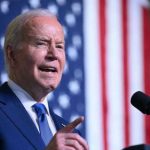By Azimazi Momoh Jimoh, Abuja
The Nigeria Governors’ Forum (NGF) has urged its members to support the legal battle on the naira redesign policy against the Federal Government at the Supreme Court.
In a communique released on Sunday after its Saturday meeting, the NGF made it clear that “Members rose from the meeting agreeing to direct their Attorneys General to review the
the suit at the Supreme Court with a view to consolidating the legal reliefs pursued by States.”.
In the communique which was signed by the chairman of the NGF and governor of Sokoto State, Aminu Waziri Tambuwal, the state governors “called on the Federal Government and the CBN to respect the Rule of Law and listen to the voice of reason expressed by Nigerians and several other stakeholders including the Council of State, before the damage to our economy becomes too great to fix by the next administration”
The State governors described the currency redesign and exchange program as a form of currency confiscation that has inflicted so much pain on citizens.
“It is our considered view that what the CBN is at present pursuing is a currency confiscation programme, not the currency exchange policy envisaged under S20(3) of the CBN Act, 2007. Currency confiscation in the sense that the liquidity provided to the general public is grossly insufficient due to the restrictions placed on the amount that can be withdrawn regardless of the amount deposited.” The communique stated.
The governors said, “the current approach of the CBN raises concerns about the respect for the civil liberties and rights of Nigerians as it relates to their freedom to use legitimately earned income as they so wish.”
They expressed the belief that “to deploy a cashless policy and deepen digital transactions, the best practice around the world is to create a suite of incentives to attract customers; rather
than a draconian approach as we have witnessed in the last three months.”
The communique further reads: “The argument by the CBN for what it describes as the astronomical increase in the currency in circulation as the basis for this policy is not supported by its own data”
“According to the CBN, the currency in circulation increased from N1.4 trillion in 2015 to N3.23 trillion in October 2022. The Bank appears not to have taken into consideration the increase in the size of the country’s nominal GDP over this period, the doubling of consumer prices, the rising population, and the impact of the humongous Ways & Means advances to the federal government by the Central Bank of Nigeria over this period.”
“In the circumstances, it is safe to draw either of two conclusions – the CBN data may be incomplete or in fact, Nigerians may have done exceptionally well in the transition to a
cashless economy”
The governors also noted that “considering the sizeable informal sector in the nation, the amount of banknotes created in exchange so far by the CBN implies it vastly underestimated the economy’s actual cash needs.”
“The inability to use the new notes has had far-reaching economic effects, leading to the emergence of the Naira black market, severe food inflation, variable commodities prices based on the method of exchange, and long queues as well as crowds around Automated Teller Machines (ATMs) and banking halls across the country with individuals hoping to get a fraction of their money in new notes to meet their daily livelihood. The country runs the risk of a CBN-induced recession.” The state governors warned.
Expressing concerns that despite the Supreme Court ruling, the CBN was yet to effect any change in its approach, the governors said: “While we acknowledge the submission of the Attorney General of the Federation that the Federal Government will comply with the ruling of the Supreme Court which calls for the halting of CBN’s plan to end the use of the old currency notes, we are yet to observe changes in the financial system”
Source: The Guardian









Your point of view caught my eye and was very interesting. Thanks. I have a question for you.